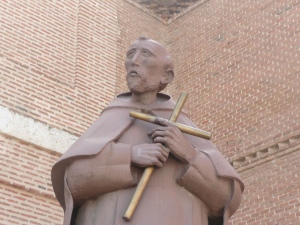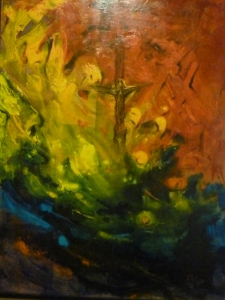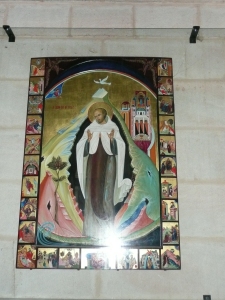John proclaims divine love with great tenderness that uses human love as its point of departure. In the Spiritual Canticle John of the Cross describes the growing relationship of two lovers. The poem is full of intimacy, passion, intensity, sensualness, and a longing for union—all of which take hold of the reader. It is not only that in reading it we can think of our intimate relationship to God but we can also think of our passionate desire and intimate longing for our own lover. Arthur Symmons summarize what several have implied, “This monk can give lessons to lovers.” There is a profound affective sensuous dimension to John’s poetry. He could not write like he does without feeling as we do when we read it. Clearly, in spite of his emphasis on purification, John does not propose the destruction of sense but the total unification of affectivity towards God. He also indicates that we rediscover sense refined at the end of purification. Was John totally detached from the sensory pleasure of his work? When we witness such clumsy and selfish approaches to love today, it is refreshing to read the sensitive, delicate, considerate, and, yes, sensual and passionate approaches he describes and suggests.

There is no explicit religious language in the poem. It is a poem about lovers. In his commentary he gives profound religious explanations but intertwined are comments about the approaches of lovers to each other. Here is a short selection of his many comments.
“Lovers are said to have their hearts stolen or seized by the object of their love” (C. 9.5).
“[S]he affectionately calls him here the light of her eyes, just as a lover would call her loved one the light of her eyes in order to show her affection” (C. 10.8).
“Supper affords lovers refreshment, satisfaction, and love” (C. 14-15.28).
“[G]irls attract lovers to themselves by their affection and grace” (C. 18.4).
“Anyone truly in love will let all other things go in order to come closer to the loved one” (C. 29.10).
“New lovers are comparable to new wine. . . .These new lovers find their strength in the savor of love.” (C. 25.10).
“Now then, the old lovers . . . are like old wine . . . these lovers taste the sweetness of the wine of love” (C. 25.11).
“Strange it is, this property of lovers, that they like to enjoy each other’s companionship alone” (C.36.1)
“The reason they desire to commune with each other alone is that love is a union between two alone” (C. 36.1).
“For lovers cannot be satisfied without feeling that they love as much as they are loved” (C. 38.3).
The first thing that John teaches lovers is to value love alone above all else. This will imply risk, but God’s love of us is such that God is willing to take a risk with us. Once a commitment is made then one’s capacity for love depends on the exclusive and integrated focus of every aspect of one’s life. Love implies total self-surrender to one’s lover; it is never stationary but always in movement—a long journey in which love matures gradually. Together they find “mutual refreshment and renewal in love” (C. 13.2).

John knows the importance between lovers of keeping a diligent watch over one’s heart. At the beginning of the poem the bride sees in herself a lot of conscious and unconscious resistance to God’s love and illumination and needs the purification of false loves and attachments (C. 1.1). In searching for her beloved she refuses to digress (C. 3.5), nor be tempted by enemies of her single-hearted pursuit (C. 3.6-7). As she gets closer to her Beloved she still keeps in check “many various kinds of images . . . brought to the memory and phantasy and many appetites and inclinations . . . stirred up in the sensory part” (C. 16.4). She longs for her heart to be carefully centered on her Beloved and to resist the negative drying up of interest that comes with “the foxes” (sensory movements) (C. v.16), the “deadening north wind” (dryness) (C. v.17), or the “girls of Judea” (lower affections) (C. v. 18). Once she enters spiritual marriage Aminadab (the devil) no longer appears, the siege is stopped (appetites and passions), and the cavalry descends (all bodily senses are controlled) (C. v. 40). A diligent watch over one’s heart helps the bride to maintain an exclusive focus on her Lover. “Deny your desires and you will find what your heart longs for” (S. 15).
Lovers always find it is difficult to be away from each other and also they often feel unworthy of each other when they are together. They savor the pain of both absence and presence. “Beholding that the bride is wounded with love for him, because of her moan he also is wounded with love for her. Among lovers, the wound of one is a wound for both” (C. 13.9). Prior to spiritual betrothal the “wounds” of love of the bride are mentioned twenty-five times. These experiences of pain at the Lover’s absence feel like a fire of love, enflamed within her (C. 1.17), and she tells him she is dying without him, wants nothing but him alone, feels unhealthy and incomplete without him, feels he has stolen her heart and nothing else matters anymore. Through these purifying wounds her love becomes impatient, burning, ardent, intense, and vehement. This purification becomes a progressive surrender to love. As the bride in the Song of Songs (8:6-7), the bride here indicates that nothing can quench love, neither floods drown it; she clearly wants her Lover as a seal upon her soul, for love is as strong as death.
Lovers want total self-gift from each other; partial gift is not what lovers want to give nor want to receive. They seek from each other what the psalms call “steadfast love,” that is “precious,” and “better than life” (Pss 36, 63, 89). In the Spiritual Canticle the bride tells her Lover do not hide, do not send me any more messengers, wholly surrender yourself, how can I endure not living where you live. She insists – carry me off, cure my love-sickness, extinguish my pain from your absence, reveal your presence. She sees her Lover’s gifts and signs of his presence everywhere—everything reminds her of him and speaks of his love.

Beautiful gardens in Segovia
She rests in his delight, finds her bed is in flower, enters the inner wine cellar of love, loses interest in all else, gives herself totally to him, and now she wounds him with her love. She has found her longed-for mate, finds love in solitude with him, and discovers her Lover in new ways never before imagined.













